PDF chapter test TRY NOW
The story opens with a British soldier named Tom penning a letter to his sister Janet on Christmas Day, 1914.

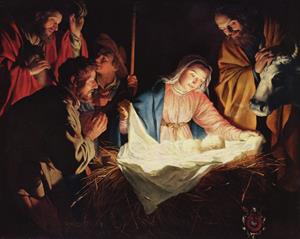
In his letter, the British soldier said that it was 2 a.m. and that his fellow soldiers were dozing in their dugouts. A “dugout” is a shelter made of a hole dug into the earth and usually covered with a roof. Even though it was late, he couldn’t sleep well because he had wanted to write a letter to his sister stating what happened on Christmas Eve. He also remarked that thinking about what occurred on Christmas night made him feel like he was in a fairy tale. It suggests that what happened seemed to be beyond his wildest dreams. He also stated that if it hadn’t happened to him, he would not have believed it.
Furthermore, the soldier claimed that on Christmas Eve in London, while his sister and parents were singing carols in front of the fire, he was singing carols with his enemy men on the battlefields of France. As he previously stated, there had been little serious combat in recent months. When the first conflict broke out, many people on both sides lost their lives. Here the term “both sides” refer to Germany and the United Kingdom. Many soldiers lost their lives, and the remaining soldiers were forced to remain in the trenches and wait to see who would kill them next. They were also in charge of carrying out the fights until new ones were dispatched to deal with the enemies.
The British soldier then said that what a torturous wait it had been. He made the statement because they knew that anything would happen at any moment. He claimed that they were aware that their enemy soldier would appear in the trench next to them at any time. They would arrive with a large number of explosive bombs or weapons, killing and injuring them to become handicapped. Then he went on to say that daytime was more dangerous than nighttime. They might hide in the trenches at night and attack their adversaries. They couldn’t move their heads from the ground throughout the day. They feared because their enemies would hide and attack them at any time from the trenches using their bullets.
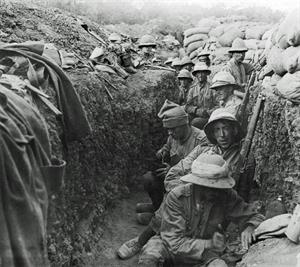
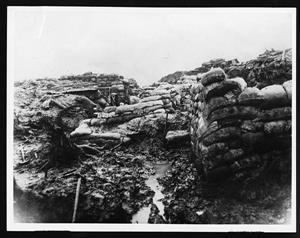
Muddy trench*
After overcoming all of the challenges, the British soldier stated that they had to focus on the enemy team at all times, even whether they were in the mud or rain. On the other hand, he said that the Germans were going through the same difficulties. They were in the trenches as well, and their trenches were also filled with water and mud. He also stated that their first trench was about 50 yards (50 meters) away from the German soldiers. Then he said that there lay “No Man’s Land” between the German and British team. The term “No Man’s Land” refers to an area or strip of land that no one owns or controls. Also, the place was surrounded by wire fences. However, the enemies were close to them; they could occasionally hear their voices.
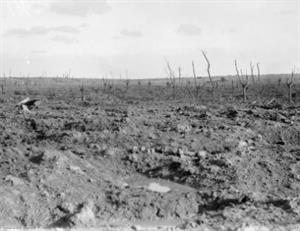

Snowfall
During the day, there was little bombing or rifle fire from either side. As night approached on Christmas Eve, the firing came to a complete halt. It was the first time in months the place remained silent without any violence's. They hoped for a peaceful holiday, but they were not expecting it. The British soldiers received the order that the Germans might attack them at any time, and they had to be careful about it.
The above paragraph shows the situation of the soldiers who were serving the people from the borders. Even though it was Christmas eve, they couldn't have some fun or entertainment. They were constantly aware that a conflict may break out at any moment, and they had to fight to defend their companions. As the story was a piece of study material for students, the lesson conveys the true sufferings of the soldiers.
Coming back to the story, the British soldier then went to the dugout to relax. While resting on his cot he had fallen asleep. But all of a sudden his friend John called him and said, "Come and see!" John asked his friend to see what the Germans were doing. By thinking something terrible was going to happen, the British soldier snatched up his rifle. He then came out into the trench and carefully looked over the sandbags.
The British soldiers were unfamiliar with the carol song when they heard it. But John was well-versed in the song and translated it into English for the British soldiers. John says that Stille Nacht's Heilige Nacht means "Silent Night, Holy Night."
| Lines | German | English translation |
| 1 | Stille Nacht, heilige Nacht! | Silent night, holy night! |
| 2 | Alles schläft, einsam wacht | All is asleep, only the faithful, |
| 3 | Nur das traute, hochheilige Paar. | Most holy couple is awake. |
| 4 | Holder Knabe im lockigen Haar, | Gentle boy with curly hair, |
| 5 | Schlaf in himmlischer Ruh, | Sleep in heavenly peace, |
| 6 | Schlaf in himmlischer Ruh. | Sleep in heavenly peace. |
After hearing the song, the British soldier said that in that quiet, pure night, its darkness lightened by a first-quarter moon, he hadn’t heard such meaningful and lovely song.

First quarter moon
The men in the British group complimented the Germans when they stopped singing the carol. They applauded them. Despite being on opposing teams, they enjoyed the Germans’ lovely music due to the light music and the peaceful Christmas night. On the border, they’ve never heard such light music before. Later, one of the British team members began singing a song, and the rest of the team joined in. They sang “The first Nowell, the angel did say ...” in chorus, and then the British soldier said that, in reality, they didn’t sing well as the Germans did. The Germans were known for their outstanding harmonies. The phrase “harmony” refers to a pleasing musical sound created by multiple notes being played or sung simultaneously. The Germans then responded with their loud clapping and began singing another carol. They sang "O Tannenbaum, O Tannenbaum..."
The Britishers didn't expect the Germans would come to their place. To their surprise, two German soldiers came out from the trench. They climbed over the barbed wires without any rifles and bombs and reached near the No man's Land. Then one of the German asked the Britishers to send their officer to discuss something. While the man started to speak, one of the British men lifted the rifle to attack him. On seeing that, the others also kept their rifles ready. They were in the notion that the Germans would attack them. On the other hand, the captain of the British team asked the British soldiers to drop the weapon. Then the captain of the team came out from the trenches to meet the Germans.
Later, the Britishers could see that two or three men from the German group come out from their trenches. Then they walked towards the British soldiers. After seeing them, some of the members of the British group came out from their trenches. Within minutes hundreds of soldiers and officers from British and German groups gathered in the No Man's Land. Then they stood on each side and started greeting each other. They were shaking hands with each other, who had been attempting to kill each other only hours before. It shows how their enmity had vanished because of a celebration.

Bonfire
The British soldier then stated that only a couple of his men knew German. On the other hand, most of the Germans knew English very well. So he asked one of the members from the Germans why it was like that. Later, one of the Germans said that many of his people had worked in England. Then he said that earlier, he had worked as a waiter in Hotel Cecil. Also, he said if the British soldier had previously visited the same hotel, he would have waited at his table. After hearing that, the British soldier laughed and said he might have met him earlier.
Meanwhile, another German said that he had been working as a porter at Victoria Station. He showed him a photograph of his family in Munich. The British soldier then told him that he would like to meet his family members someday because it was wonderful to see the happy family. Later, the German man happily provided him with the address of his family.
As the Germans and the Britishers had difficulty while communicating, they swapped gifts with each other. The Britishers exchanged their things with the Germans. They gave tea to the Germans and got back their coffee. They gave the Germans the corned meat, and the Germans returned them their sausage. Uniform badges and buttons were exchanged with one another in the symbol of happiness and memories. One of the boys from the Britisher’s team went away with a spiked helmet. The term “spiked helmet” refers to a headgear worn in the 19th and 20th centuries by the Prussian and German military, firefighters and police. Later, the British soldier exchanged his jackknife for a leather equipment belt. He gave it in the hope that it would serve as a momenta when he returned home.
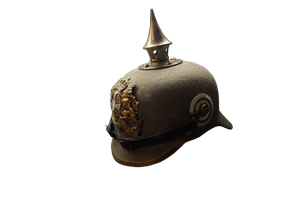
Spiked Helmet
It was late in the night; the Germans and Britishers sang a few more songs by sitting around the fire. Then the British soldier said that everyone joined together and sang on that Christmas eve. He says that he was not lying; these were the real incidents on Christmas Eve. Later, they sang “Aung Lang Syne” . It is a Scots poem written by Robert Burns in 1788 and set to a traditional folk song. It is traditionally sung on New Year’s Eve in many English-speaking countries. Then they bid goodbye and promised that they would meet each other the next day. Not only they were exchanging gifts and singing songs they had also discussed the football match.
When the British soldier was about to return to his trenches, an older German soldier grabbed his arm. The old man asked him, “why can’t we all just go home and enjoy peace?” The man would have made the statement because the enemies became the friends now and they exchanged lovely gifts, songs and chats with each other. After seeing the harmony, the old man might have posed this question to the British soldier. After listening to the old man’s question, the British soldier said gently that he had to ask this to his emperor. The British soldier made the statement because the captains were the ones who were the decision-makers. As the man grew older, the old man thought that more than fight, peace was a better thing.
After hearing the response of the British soldier, the old man looked at him with a puzzled expression and said, “we must ask our hearts.” The old man might have said that everyone needs freedom. No one had the desire to fight on the border and lose their life. They were struggling in the borders to save the people’s life. While writing everything in the letter, he asked his sister whether she had heard about such Christmas Eve anywhere in history. He questioned her what does this unthinkable friendship of enemies imply?
After asking questions to his sister, the British soldier said that fighting with the opponents and losing life was a regrettable one. Those troops may be good people, but they obey orders, just as the British soldiers do. Then he said their duty was to stop the Germans army and send that home, and we couldn’t ignore that responsibility.
Then the British soldier said that one couldn’t help but wonder what would happen if the harmony and unity happened in that night were to be caught by the world’s nations. After telling that, he said that as a result of it, disagreements might arise. Then he questioned if their leaders offered pleasant wishes instead of warnings, songs instead of insults, and presents instead of retaliation? Then he says that if such things occur in the world wouldn’t all wars cease at the same time?
At last, the British soldier said that every nation says that they need peace. Also, he said that that Christmas, he hoped that he, too, needed peace.
